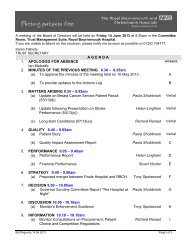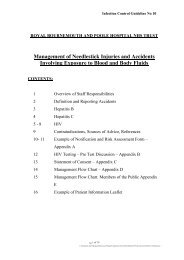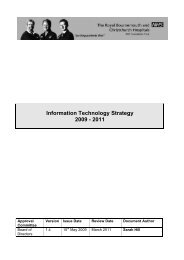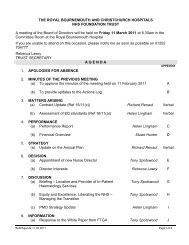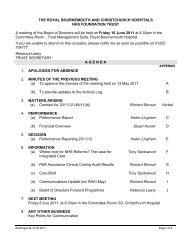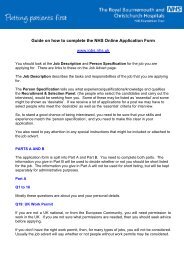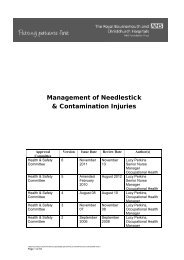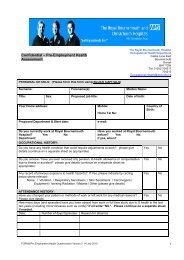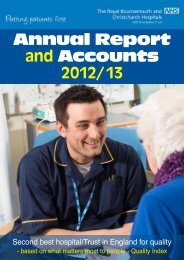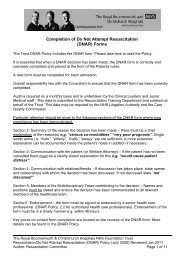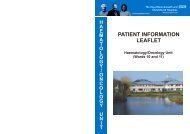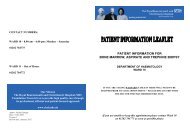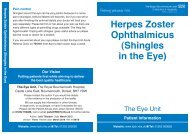Quality Report 2010/11 - Royal Bournemouth Hospital
Quality Report 2010/11 - Royal Bournemouth Hospital
Quality Report 2010/11 - Royal Bournemouth Hospital
- No tags were found...
Create successful ePaper yourself
Turn your PDF publications into a flip-book with our unique Google optimized e-Paper software.
<strong>Quality</strong> <strong>Report</strong><strong>2010</strong>/<strong>11</strong>
The <strong>Royal</strong> <strong>Bournemouth</strong> and Christchurch <strong>Hospital</strong>s NHS Foundation Trust<strong>Quality</strong> <strong>Report</strong> <strong>2010</strong>/<strong>11</strong>1. Statement by the ChiefExecutiveThis is the third <strong>Quality</strong> <strong>Report</strong> publishedby the <strong>Royal</strong> <strong>Bournemouth</strong> andChristchurch <strong>Hospital</strong>s NHS FoundationTrust to accompany our Annual <strong>Report</strong>.The Trust has had a busy and successfulyear with a strong emphasis on improvingthe quality and accessibility of theservices we provide and maintaining ourcommitment to our “Putting PatientsFirst” initiative.In this report we have outlined someof the quality activities which havetaken place in the Trust over <strong>2010</strong>/<strong>11</strong>.There are particular success stories totell in respect of some improvementsin patient and staff safety and qualityimprovement. We have also continuedto perform exceptionally well in respectof Healthcare Acquired Infections.Local patients can be reassured thatwe continue to have some of the lowestrates for MRSA and Clostridium difficileinfections in the country.members and the public on a numberof patient experiences and equality anddiversity projects this year.Finally, it has not been possible to includeall of the quality initiatives that we havebeen or will be engaged in, within thisreport, which can at best, be a snapshotof what is taking place. However, wehope that it will fulfill the purpose it setsout to - provide an accurate accountof quality activity in the Trust and todemonstrate the clear commitment of theBoard to “Putting Patients First”.To the best of my knowledge theinformation contained within this report isaccurate.Tony SpotswoodChief ExecutiveOur quality programme has also beenenhanced by wide ranging patient safetyinitiatives which covers a large rangeof specialties and topics. We continueto participate in the NHS South WestPatient Safety & <strong>Quality</strong> ImprovementProgramme which enables us to shareour experiences, ideas and learning onpatient safety initiatives with colleaguesacross the region.The report outlines our priorities for20<strong>11</strong>/12 and within these, patient safetyand continuing to improve the patientexperience will feature prominently.We welcome the opportunity to workwith patients, carers, Foundation Trust3
The <strong>Royal</strong> <strong>Bournemouth</strong> and Christchurch <strong>Hospital</strong>s NHS Foundation Trust<strong>Quality</strong> <strong>Report</strong> <strong>2010</strong>/<strong>11</strong>2. Priorities for Improvementand Statements of Assuranceon the <strong>Quality</strong> of ServicesProvided<strong>2010</strong>/<strong>11</strong> <strong>Quality</strong> ObjectivesIn line with the Trust’s vision: “Puttingpatients first while striving to deliver thebest quality healthcare”, the Trust Boardagreed a comprehensive set of strategicgoals and objectives for <strong>2010</strong>/<strong>11</strong>. Thekey goals for quality were:l To offer patient centered servicesthrough the provision of high quality,responsive, accessible, safe, effectiveand timely care.l To promote and improve the quality oflife of our patients.Performance against national priorities 2009/10l To strive towards excellence in theservices and care we provide.l To work collaboratively with partnerorganisations to improve the health oflocal people.Progress against <strong>Quality</strong>Improvement Plans for <strong>2010</strong>/<strong>11</strong>During 2009/10 the Trust madeconsiderable progress with thedevelopment of a number of qualityinitiatives. These plans were identified inthe Trust’s <strong>Quality</strong> <strong>Report</strong> for 2009/10 andcarried forward into <strong>2010</strong>/<strong>11</strong> as part of anoverall quality improvement programmewhich had the full commitment of theBoard.Progress made against the qualityobjectives set for <strong>2010</strong>/<strong>11</strong> are set outbelow:Patient ExperiencePatient SafetyAction Plan for <strong>2010</strong>/<strong>11</strong> as set out in09/10 <strong>Quality</strong> <strong>Report</strong>Implement programme of real timemonitoring focusing on the 5 priorityquestions from the National Surveymethodology and internal Trustconsultation exercise.Continue to participate in South WestSHA Patient Safety Programme andpresent monthly data to Board ofDirectors. Programme aims are toreduce hospital mortality by 15% by 2015and adverse events by 30% by 2015.To formalise walkabouts to include NPSAmethodology and ensure structureddiscussion and action for patient safety.Further revision to Modified EarlyWarning System (MEWs) policy andprocedures to ensure effective and timelyresponse to trigger events.Progress against objective in 10/<strong>11</strong><strong>Quality</strong> reporting of real time patientmonitoring to the Trust MarketingCommittee and Board of Directors.Patient surveys included in annualquality objectives and contract qualityindicators. Internal patient survey cardresults - patients participated in 10/<strong>11</strong>.62% of respondents saying that theyrated the hospital as “excellent” (graded10/10).Participation ongoing. Use of GlobalTrigger Tool to identify actual andpotential adverse events undertakenmonthly and learning points reportedto the Clinical Governance & RiskCommittee.Executive team walkabouts includepatient safety although not formallyrecorded. Executive Team walkaboutsat night initiated in year.MEWS policy updated, routine audit andreporting in place.4
The <strong>Royal</strong> <strong>Bournemouth</strong> and Christchurch <strong>Hospital</strong>s NHS Foundation Trust<strong>Quality</strong> <strong>Report</strong> <strong>2010</strong>/<strong>11</strong>Indicator<strong>Quality</strong> ImprovementObjective 20<strong>11</strong>/12Monitoringarrangements for 20<strong>11</strong>/12Monthly monitoring viaMortality Group chaired byMedical DirectorEffectivenessPreventing people from dyingprematurelyl Reducing the mortalityrate from cardiovasculardisease; respiratorydisease and liver diseasel Maintain high standards ofcare for stroke patientsl Reduce emergencyreadmissions within 28days of discharge fromhospitalHelping people to recoverfrom episodes of ill health orfollowing injuryStroke and emergencyreadmissions monitoredmonthly by Board ofDirectorsExperienceEnsuring that people have apositive experience of carel Improve patientsexperience of outpatientcare (National and localsurvey results)l Improve patientsexperience of emergencycare (National and localsurvey results)l Implement End of Life CareStrategy and action planl Implement action planfollowing NationalDementia Care AuditImplementation of real timemonitoring of patientexperience, quarterlyreporting to Board ofDirectors and Council ofGovernors (CoG). Surveyreports to Board of Directorsand CoG. End of Life careand Dementia care actionplan reports to HealthcareAssurance Committee andNHS South WestSafetyTreating and caring forpeople in a safeenvironment andprotecting them fromavoidable harml Continue to reduceinpatient fallsl Reduce incidence ofhospital related VTEl Continue to reducelevels of hospital acquiredinfections (MRSA, MSSAand C difficile)l Measure, monitor andreduce incidence ofhospital acquired category3 and 4 pressure ulcersl Comply with NPSA Alertsfor Medicines managementand prevent medicationerrors causing severeharm.l Prevent all Never Eventsl Reduce the number ofadverse events resulting insevere harmQuarterly reporting toHealthcare AssuranceCommittee and Board ofDirectorsInfection control reportsmonthly to Health ProtectionUnit and Board of Directors7
The <strong>Royal</strong> <strong>Bournemouth</strong> and Christchurch <strong>Hospital</strong>s NHS Foundation Trust<strong>Quality</strong> <strong>Report</strong> <strong>2010</strong>/<strong>11</strong>Audit Title Participation % Cases SubmittedPeripheral valvular surgery (VSGBI VascularSurgery Database)Yes100% of applicable datasubmittedCarotid Interventions Audit Yes 100% of applicable datasubmittedCABG and Valvular Surgery (Adult Cardiac Surgery Not applicable to TrustAudit)Cardiovascular Disease AuditsFamilial Hypercholesterolemia Yes 100% of applicable datasubmittedAcute Myocardial Infarction & other ACS (MINAP) Yes Routine data collection andreporting - 100% of applicabledata submittedHeart Failure AuditNot applicable to TrustPulmonary Hypertension AuditNot applicable to TrustAcute Stroke (SINAP) Yes 100% of applicable datacollected. Trust to submit toSINAP when local databasecompatibleStroke Care (Sentinel Stroke Audit) Yes 100% of applicable datasubmittedRenal Disease AuditsRenal replacement therapyNot applicable to TrustRenal transplantationNot applicable to TrustPatient TransportNot applicable to TrustRenal ColicNot applicable to TrustCancer AuditsLung Cancer Yes 100% of applicable datasubmittedBowel Cancer Yes 100% of applicable datasubmittedHead & Neck CancerNot applicable to TrustTrauma AuditsHip Fracture (National Hip Fracture Database) Yes 100% of applicable datasubmittedSevere TraumaNot applicable to TrustFalls and Non-Hip Fractures (National Falls and Bone Yes97% of cases submittedHealth Audit)Psychological Conditions AuditsDepression and AnxietyNot applicable to TrustPrescribing in Mental Health ServicesNot applicable to TrustNational Audit of SchizophreniaNot applicable to Trust10
The <strong>Royal</strong> <strong>Bournemouth</strong> and Christchurch <strong>Hospital</strong>s NHS Foundation Trust<strong>Quality</strong> <strong>Report</strong> <strong>2010</strong>/<strong>11</strong>Audit Title Participation % Cases SubmittedNational Dementia Audit Yes 97% of clinical casessubmitted, 50% of staffquestionnaires submittedBlood Transfusion AuditsO Neg Blood Use (National Comparative Audit of Yes 100%Blood Transfusion)Platelet Use (National Comparative Audit of BloodTransfusion)Yes 100%The reports of 4 National Audits werepublished in <strong>2010</strong>/<strong>11</strong> and reviewed bythe Trust. The Trust intends to take thefollowing actions to improve the qualityof healthcare provided in these areas asfollows:l Dementia - A lead consultant and aDementia strategy group have beenset up to implement the report actionplan. The group are due to presentto the Clinical Governance and RiskCommittee in May 20<strong>11</strong>. The auditof standards of dementia care in linewith the National Dementia Strategywas completed in full at the end ofMarch 20<strong>11</strong>, and the required actionplan will be developed within therequired timescale of June 20<strong>11</strong>.l Continence - A lead consultanthas been appointed and an actionplan has been presented to ClinicalGovernance & Risk Committee. Theaction plan includes review of currentpolicies and procedures. The Trustparticipated in the national review ofcontinence care in <strong>2010</strong>.l Familial HypercholesterolemiaAn action plan from the reportrecommendations is currently beingproduced and will be reported to andmonitored by the Clinical Governance& Risk Committee.l Stroke Care (Sentinel Stroke Audit)An action plan from the reportrecommendations is currently beingproduced and will be reported to andmonitored by the Clinical Governance& Risk Committee.Meeting local Clinical AuditStandardsThe reports of 74 local clinical auditswere reviewed by the Trust in <strong>2010</strong>/<strong>11</strong>.Examples of audits that have led to theTrust making a change to current practiceand ensuring continuous improvementin the quality of healthcare and servicesprovided include:AuditPatients with early inflammatory arthritisEye Unit Patient Satisfaction SurveyChange to PracticeRheumatologists to make more referrals to Multi DisciplinaryTeam (MDT) and aim for combination treatments in allsero-positive patients without contra-indicationsEye Unit to implement staggered admission times for patientsattending for surgery as patients felt waiting times were toolong<strong>11</strong>
The <strong>Royal</strong> <strong>Bournemouth</strong> and Christchurch <strong>Hospital</strong>s NHS Foundation Trust<strong>Quality</strong> <strong>Report</strong> <strong>2010</strong>/<strong>11</strong>AuditNICE Guidance on Management of SelfHarmAudit of Post Operative TemperatureNon-administration of medicines auditAudit of catheter use and documentationAudit of problem with patients self removingNG tubes on Stroke UnitVaccine Cold Storage AuditAudit of Surviving Sepsis CampaignAudit of lumbar punctureOutstanding warfarin doses by wardChange to PracticePsychiatric Liaison Team to deliver training to EmergencyDepartment staff and improve the current psychiatric proformato aid staff to undertake comprehensive assessmentsTheatres to ensure Intra-operative monitoring and heatingsystems are used more widelyA new “Don’t miss doses” flow chart has been put on all drugtrolleys to encourage further action after a missed dose codehas been used. A new inpatient drug chart has also beenintroduced with missed dose pages to highlight reasons fornon-administrationImplemented use of a catheter insertion sticker in the medicalnotesThe Unit are developing a daily checklist for safe andappropriate use of mittensCool boxes and packs to be supplied to areas for use whentransporting cold storage items and defrosting fridges. Standalone max/min thermometers provided for each area that storescold chain pharmaceuticalsSepsis proforma has been put on the Emergency Departmentrecord system to aid use, implementation and audit.Implementation of a new Trust wide proforma to follow whenperforming lumbar puncture. Accompanying guidance alsoimplemented.Change of timing of warfarin dosing introduced across the TrustParticipation andImplementation of NationalConfidential Enquiry(NCEPOD) reportsDuring <strong>2010</strong>/<strong>11</strong>, 4 applicable NationalConfidential Enquiry (NCEPOD) reviewscovered NHS Services. During thatperiod the Trust participated in 100%national confidential enquiries which itwas eligible to participate in.The National Confidential Enquiries thatthe Trust was eligible to participate induring <strong>2010</strong>/<strong>11</strong> are listed below. Thereviews that the Trust participated in, andfor which data collection was completedduring <strong>2010</strong>/<strong>11</strong> are listed alongside thenumber of cases submitted to eachreview as a percentage of the number ofregistered cases required by the terms ofthat enquiry.Between April <strong>2010</strong> and March 20<strong>11</strong> theTrust submitted data to the followingNational Confidential Enquiries:12
The <strong>Royal</strong> <strong>Bournemouth</strong> and Christchurch <strong>Hospital</strong>s NHS Foundation Trust<strong>Quality</strong> <strong>Report</strong> <strong>2010</strong>/<strong>11</strong>Title Participation % Cases SubmittedNCEPODParenteral Nutrition Study Yes 62% of case questionnaires returned(13 cases selected for study)Cosmetic Surgery StudyNot applicable to the TrustElective & Emergency Surgery inthe Elderly StudyYes100% of required surgical questionnaires and78% of anaesthetic questionnaires returned.(9 cases in study period)Peri-operative Care Study Yes 100% of required data submitted (189 casesin study period)Surgery in Children Study Yes 100% compliance with study requestCardiac Arrest Study Yes 100% of required data submitted (6 cases instudy period)CMACEPerinatal Mortality Study Yes 100% compliance, ongoing data submissionBetween April <strong>2010</strong> and March 20<strong>11</strong> the Trust also received the following reports:NCEPODAcute Kidney Injury -“Adding Insult to Injury”Parenteral Nutrition -“A Mixed Bag”Deaths in Acute <strong>Hospital</strong>s -“Caring to the End?”Emergency and ElectiveSurgery in the Elderly -“An Age Old Problem”Cosmetic Surgery -“On the Face of It”National Confidential Inquiry intoSuicide and Homicide by Peoplewith Mental IllnessCMACEPerinatal Mortality 2008(published July <strong>2010</strong>)Review of MaternalDeaths in the UnitedKingdom related toA/H1N1 2009 InfluenzaAction TakenLead Consultant appointed. Action plan in place and further audits completedin medicine and surgery to review progress.Lead Consultant appointed. Gastroenterology Working Group establishedto take forward recommendations.Lead Consultant appointed. Working Group established which led toreview of acute services particularly handover procedures. Admissiondocumentation has been revised and extended to surgical patients. Endof Life Strategy Group established to take forward a number of specificreport recommendations.Lead Consultant appointed. Working Group established and currentlyconsidering how to improve Medicine for the Elderly (MFE) input into careof elderly surgical patientsThis report was reviewed by the Clinical Governance & Risk Committee.There were no relevant recommendations for the Trust.This report was reviewed by the Clinical Governance and Risk Committeeand Consultant Lead for Liaison Psychiatry Team. There were norecommendations applicable to the Trust.The report has been reviewed by the Maternity Unit and an action planis in place. In accordance with the national report recommendations, aguideline is to be formulated for babies delivered at less than 22 weeksgestation.This report has been considered by the Maternity Unit and appropriateprotocols and procedures are in place13
The <strong>Royal</strong> <strong>Bournemouth</strong> and Christchurch <strong>Hospital</strong>s NHS Foundation Trust<strong>Quality</strong> <strong>Report</strong> <strong>2010</strong>/<strong>11</strong>NCEPODMaternal Obesity in the UKCMACE Emergent ThemeBriefing 1 - Genital Tract SepsisAction TakenThe report was reviewed by the Maternity Unit and guidelines werealready in place for antenatal care and the management of diabetes inpregnancy. These have subsequently been updated and new ObesityGuidelines implemented in accordance with the report recommendations.The report was reviewed by the Maternity Unit and existing Postnatalcare guidelines were found to be compliant with the majority of the reportrecommendations. The guidelines have been subsequently updated toinclude an updated list of symptoms of serious infection. In addition, anaction plan is in place to update antenatal and postnatal care patientinformation and stress the importance of good personal and perinealhygiene.Research GovernanceThe Trust continues to take a leading rolein local and regional research initiativesand is the largest recruiter to clinical trialsin the South West region outside theteaching hospitals.In <strong>2010</strong>/<strong>11</strong> the Trust had 161 openprojects, of these 69 were new projectsfor <strong>2010</strong>/<strong>11</strong>. All 69 new projects receivedapproval from the relevant EthicsCommittee. 56% of both open and newprojects are cancer trials.We recruited 1010 new patients toNational Institute for Health Research(NIHR) adopted studies which is a 10%increase on last year.National policy now dictates that weconcentrate solely on NIHR studies.However we are able to continue tosupport our rich tradition of own accountresearch because our healthy industryliaison generates the income to do so.In previous years, our portfolio of NIHRadopted studies was almost exclusivelycancer trials coordinated through theDorset Cancer Research Network.While this remains strong, investment inresearch infrastructure within the Trustis now showing increased recruitmentto cardiology, stroke, vascular andrheumatology trials. We intend tocontinue this strategy with an aim ofbroadening the range of our portfolio inorder to comply with the DH 5 year targetof doubling our recruitment by 2015. By20<strong>11</strong>/12 we should have enough data toshow trends in graphical form.The trend to local collaboration with<strong>Bournemouth</strong> University and the otherAcute Trusts has become less of apriority due to the financial pressures. Asa lead Trust with a healthy portfolio, weneed to ensure our collaborations do notprove a drain on our management andfinancial resources.The Trust was inspected by theMedicines & Healthcare RegulatoryAuthority (MHRA) in October <strong>2010</strong>to ensure our Research Governancesystems conformed to statutorydirectives. The report encouraged usto continue sponsoring clinical trialsof medicinal products and suggestedmodifications to our pharmacovigilanceand quality management systems whichhave been implemented. The reportalso highlighted a need for increasedinvestment in monitoring especially of theclinical involvement of local investigators.This will be addressed in 20<strong>11</strong>.14
The <strong>Royal</strong> <strong>Bournemouth</strong> and Christchurch <strong>Hospital</strong>s NHS Foundation Trust<strong>Quality</strong> <strong>Report</strong> <strong>2010</strong>/<strong>11</strong>Commissioning for <strong>Quality</strong> andInnovation (CQUIN) objectivesand Achievements for <strong>2010</strong>/<strong>11</strong><strong>Royal</strong> <strong>Bournemouth</strong> & Christchurch<strong>Hospital</strong>s NHS Foundation Trustincome for <strong>2010</strong>/<strong>11</strong> was not conditionalon achieving quality improvementsand innovation goals through theCommissioning for <strong>Quality</strong> andInnovation Framework. As an alternativethe provider and the lead commissioneragreed an extensive set of quality andperformance indicators, including thenational CQUIN indicators and thesewere formally monitored throughout theyear on a monthly basis.Care <strong>Quality</strong> CommissionRegistrationThe Trust is required to register with theCare <strong>Quality</strong> Commission and its currentregistration status is unconditional.The CQC has not taken any enforcementaction against the Trust during <strong>2010</strong>/<strong>11</strong>.The Trust has not participated in anyspecial reviews or investigations by theCQC relating to its license in <strong>2010</strong>/<strong>11</strong>.The Trust receives monthly reports onquality and patient safety from the Care<strong>Quality</strong> Commission (QRP reports). Thereport is reviewed in detail by the leaddirector and any significant changesreported to the Healthcare AssuranceCommittee for action. The report isalso used to identify any areas forfurther scrutiny, for example by InternalAudit, patient survey and/or Council ofGovernors feedback. The March 20<strong>11</strong>QRP report provided assurance that theTrust was rated as having a low risk ofnon compliance with its Care <strong>Quality</strong>Commission registration.Data <strong>Quality</strong> and InformationGovernanceAll NHS Trusts are required to completean annual information governanceassessment via the InformationGovernance Toolkit (IGT). The selfassessment must be submitted, withall evidence uploaded, to Connectionfor Health by the 31st March 20<strong>11</strong>. Theresults are shared with the Care <strong>Quality</strong>Commission, Audit Commission, Monitorand the National Information GovernanceBoard.The overall score for the Trust in <strong>2010</strong>/<strong>11</strong>is 68% (Green). The Trust was able todemonstrate the required level 2 scorefor the 22 key requirements, and level2 for all remaining requirements of theInformation Governance Toolkit.Examples of actions taken to improvearrangements for information governancein <strong>2010</strong>/<strong>11</strong> have included:l Appointment of a dedicatedInformation Governance and Freedomof Information Officerl Information Governance training for allstaffl Full audit of evidence uploaded for allrequirementsWhilst improvements were made, theTrust recognises that actions are stillrequired to further embed informationgovernance policies and procedureswithin the Trust. An action plan to reachLevel 3 across all requirements by31st March 2012 will be implementedfollowing the March 20<strong>11</strong> submission.15
The <strong>Royal</strong> <strong>Bournemouth</strong> and Christchurch <strong>Hospital</strong>s NHS Foundation Trust<strong>Quality</strong> <strong>Report</strong> <strong>2010</strong>/<strong>11</strong>Data <strong>Quality</strong>During <strong>2010</strong>/<strong>11</strong> the Trust has continuedto review the data quality of recordssubmitted to the Secondary User Service(SUS) to ensure our published data is ascomplete and accurate as possible. Foradmitted patient care and outpatients wehave exceeded the required informationgovernance standards for the core dataquality indicators (i.e. patient’s NHSnumber, registered GP and postcode).Activity TypeData <strong>Quality</strong>IndicatorData <strong>Quality</strong>TargetRBCH(Apr 09 - Mar 10)National(Apr 09 - Mar 10)Inpatients NHS number 98.0% 99.7% 98.5%Inpatients Registered GP 99.0% 100.0% 99.8%Inpatients Postcode 100.0% 100.0% 99.8%Outpatients NHS number 98.0% 99.9% 98.8%Outpatients Registered GP 99.0% 100.0% 99.8%Outpatients Postcode 100.0% 100.0% 99.7%A&E NHS number 96.7% 91.9%A&E Registered GP 100.0% 99.7%A&E Postcode 99.9% 99.7%In <strong>2010</strong>/<strong>11</strong> the Trust was subject to aPayment by Results (PbR) clinical codingaudit by the Audit Commission. The PbRaudit covered 300 Finished ConsultantEpisodes (FCEs). 200 were selected froman area audited as a national theme,General Medicine (100) and Cardiology(100).The remaining 100 FCEs wereselected based on discussions with ourlocal commissioners.Area audited Specialty/ Sub-chapter/ HRG Sample sizeSpeciality A General Medicine 100Speciality B Cardiology 100Sub-chapter JC - Skin surgery 70HRGEB01Z Non interventional acquired cardiac conditions19 years and over3016
The <strong>Royal</strong> <strong>Bournemouth</strong> and Christchurch <strong>Hospital</strong>s NHS Foundation Trust<strong>Quality</strong> <strong>Report</strong> <strong>2010</strong>/<strong>11</strong>The error rate reported in the latestpublished audit for diagnosis andtreatment coding is 10% which is asignificant improvement compared tothe previous year error rate of 24%.The Trust is performing close to thenational average (9.1%) when comparedto the overall performance of trustsin 2009/10. The results should not beextrapolated further than the actualsample audited. The speciality’s auditedare listed above.The Trust is continuing to improve thequality of the source documents forcoding which will help to reduce ourcoding error rate below the nationalaverage. The Coding improvement workhas seen much better accuracy onprimary and secondary diagnosis andprocedure codes.The vast majority of issues identified inthe Audit have already been rectified asrelatively straight forward issues, leavingthe Trust well positioned for extremelyhigh accuracy rates next year. To furtherimprove coding accuracy, the move awayfrom READ coding, planned for <strong>11</strong>/12,will ultimately reduce error rates. This willmake a more meaningful comparison tothe national average rates, as most Trustsdo not have to deal with the handicap ofcoding in a separate system (READ) andtranslating into International Classificationof diseases version 10 (ICD10) and Officeof Population Census & Surveys (OPCS)classification of surgical operations andprocedures version 4.5.These measures combined with ongoingclinical engagement and the move toelectronic notes give assurance thatcoding accuracy is improving.The net effect of these codingadjustments was zero pounds, i.e. therewas no gain or loss to any organisationas a result of the audit.17
The <strong>Royal</strong> <strong>Bournemouth</strong> and Christchurch <strong>Hospital</strong>s NHS Foundation Trust<strong>Quality</strong> <strong>Report</strong> <strong>2010</strong>/<strong>11</strong>3. Other InformationThe following section provides anoverview of the care offered by the Trustbased on performance in <strong>2010</strong>/<strong>11</strong> againstkey quality indicators selected by theBoard in consultation with stakeholders.The indicators selected demonstratethe Trusts commitment to patient safety,clinical effectiveness and enhancingthe patient experience. The rationalefor selection of these indicators is onthe basis of data collection, accuracyand clarity as well as the feedbackmechanisms previously outlined onpage 5.Patient Safety <strong>Report</strong>ing andManagement of Adverse EventsThe Trust promotes a culture ofreporting and learning from potentialand actual adverse events. Staff areencouraged to report near misses andpatient safety incidents. All reports areformally investigated and action plansare developed to reduce the risk ofrecurrence. Lessons learnt are widelyshared across the organisation and,where relevant, with the local healthcommunity.While the numbers of reported incidentscan be seen to have increased overthe last few years this is viewed as apositive indicator demonstrating a culturewhere staff feel able to report incidentsand have confidence that appropriateactions will be taken. As more non harmevents are reported the potential toreduce or prevent actual harm eventsfrom occurring increases as a result ofinvestigation and learning and this can beseen below:The graph below clearly shows thatthe positive reporting culture within theorganisation has resulted in an overallincrease in reported incidents and adecrease in the number of moderate,major and catastrophic severity events.All incidents <strong>Report</strong>ed - April 2004 to March 20<strong>11</strong>Severity as % of Total18
The <strong>Royal</strong> <strong>Bournemouth</strong> and Christchurch <strong>Hospital</strong>s NHS Foundation Trust<strong>Quality</strong> <strong>Report</strong> <strong>2010</strong>/<strong>11</strong>Patient Safety Incidents <strong>Report</strong>ed 2009/10, <strong>2010</strong>/<strong>11</strong>The Trust routinely reports all patientsafety incidents to the National PatientSafety Agency and the National<strong>Report</strong>ing and Learning System (NRLS).Benchmarking show the rates of NRLSreported patient safety incidents per100 admissions in the Trust comparedto similar Acute Trusts during the periodApril <strong>2010</strong> to November <strong>2010</strong>. The Trusthas a rate of 4 per 100 admissions whichis around the average for all mediumAcute Trusts.Reducing Medication Incidentsand Improving SafetyThe Trust’s Medicines GovernanceCommittee is chaired by the MedicalDirector and its remit is to enhanceand monitor the Trust’s strategyto reduce medication errors,compliance with national standards formedicines management and ensuringimplementation of safe practice alertsand reports.Medication Incidents (all events including near misses and no harm events) reported <strong>2010</strong>/<strong>11</strong>Medication Incidents <strong>Report</strong>ed 2009/<strong>11</strong>19
The <strong>Royal</strong> <strong>Bournemouth</strong> and Christchurch <strong>Hospital</strong>s NHS Foundation Trust<strong>Quality</strong> <strong>Report</strong> <strong>2010</strong>/<strong>11</strong>Patient Safety and <strong>Quality</strong> ImprovementInitiatives to support medication safetyand medication incident reduction during<strong>2010</strong>/<strong>11</strong> have included:Omitted or delayed dosesNew resources to reduce the number ofmissed or delayed doses of medicationhave been written and implementedin <strong>2010</strong>/<strong>11</strong>. In particular, the Trustprescription chart has been revised toenable accurate recording of omitteddoses. Resource material to supportmandatory training has been developedand small group training sessions havebeen held on wards led by our MedicinesManagement Nurse.Medicines reconciliationIn <strong>2010</strong>/<strong>11</strong> there has been continuedwork to improve documentation andencourage doctors to resolve medicationdiscrepancies identified by pharmacistsin a timely way. Liaison with primarycare ensures that action taken onchanges to medication in hospital iscommunicated in discharge letters to GPsurgeries. Audits to monitor progress areroutinely undertaken and reported to theMedicines Governance Committee.Oral liquidsTeaching sessions on the correctadministration of oral liquid medicationusing purple syringes have been heldon the wards by the Trust MedicinesManagement Nurse. Routine audit ofpractice has also been implemented tomonitor compliance.Safer lithium therapyWorking with Development DorsetHealthcare Trust the Trust has producedTrust-wide guidelines - “Lithium in theacute hospital setting”. A newsletterhighlighting safe practice has beencirculated and resources added to theMedicines Management Intranet page.Safer administration of insulinGuidelines, teaching materials and anamended Diabetes Prescription Chart(incorporating new NPSA guidance) wereimplemented in <strong>2010</strong>/<strong>11</strong>.The Trust has also established aMedication Incident Review Group whichis multidisciplinary and meets monthly toreview reported adverse incidents (actualand potential) relating to medicines, tomonitor trends and recommend furtheraction or communication of learningpoints where appropriate. The MedicationIncident Review Group reports toMedicines Governance Committee.Reducing Patient FallsPatient Accidents form the largest groupof all patient safety incidents reported tothe NPSA via the National <strong>Report</strong>ing andLearning System (NRLS).The NPSA category “patient accidents”includes any slips, trips or falls bypatients. These may be non harm eventse.g. a patient has fallen walking along award corridor but not sustained an injury,or a harm event when a similar incidenthas occurred and the patient sustained abruise, cut or more serious injury.The Trust has invested heavily in stafftraining and equipment provision over thepast three years in order to reduce thenumber of patient falls.In <strong>2010</strong>/<strong>11</strong> the Trust completed atotal bed and mattress replacementprogramme which has resulted inall patients now being treated onan electronic profiling bed and high20
The <strong>Royal</strong> <strong>Bournemouth</strong> and Christchurch <strong>Hospital</strong>s NHS Foundation Trust<strong>Quality</strong> <strong>Report</strong> <strong>2010</strong>/<strong>11</strong>RBCH <strong>Report</strong>ed Patient Falls (all events) - <strong>2010</strong>/<strong>11</strong>specification mattress. In addition, newequipment for moving and handlingpatients has been purchased and trainingprovided within clinical mandatorytraining days and ward based updates.Further work to improve patientmobility and bedrail risk assessmentdocumentation is programmed for20<strong>11</strong>/12 and will be monitored by theTrust Falls Prevention Group.Infection Prevention andControlThe Trust’s Board is committed toinfection prevention and control as a keypriority at all levels of the organisationand takes a very active interest inthe monitoring of infection controlperformance. The Director of Nursingwho acts as the Director of InfectionPrevention and Control (DIPC) briefs theBoard on a regular basis.The Trust publishes a detailed InfectionControl Annual <strong>Report</strong> which is releasedpublically and available on the Trustwebsite.Clean EnvironmentThe Patient Environment Action Team(PEAT) programme was established toassess NHS hospitals in 2000, and hasbeen managed by the National PatientSafety Agency since 2006. Under theprogramme Acute Trusts are assessedannually and are rated in terms of thequality of the patient environment,including cleanliness.The following table shows the PEATscores for this Trust for the past fiveyears. The results for <strong>2010</strong> identified animprovement to the Food and Privacy &Dignity Scores for Christchurch <strong>Hospital</strong>.MRSA bacteraemiaThe Trust has been successful inreducing our rate of MRSA bacteraemiathis year and reported no cases in theyear.MRSA ScreeningThe Trust continues to meet the MRSAscreening target for elective patients.Achievement over 100% occurs asthis target is calculated by dividing the21
The <strong>Royal</strong> <strong>Bournemouth</strong> and Christchurch <strong>Hospital</strong>s NHS Foundation Trust<strong>Quality</strong> <strong>Report</strong> <strong>2010</strong>/<strong>11</strong>Year Site EnvironmentScoreFood ScorePrivacy &Dignity Score20<strong>11</strong> Christchurch <strong>Hospital</strong> Good Excellent Good<strong>Bournemouth</strong> <strong>Hospital</strong> Good Good Excellent<strong>2010</strong> Christchurch <strong>Hospital</strong> Good Excellent Excellent<strong>Bournemouth</strong> <strong>Hospital</strong> Good Good Good2009 Christchurch <strong>Hospital</strong> Good Acceptable Good<strong>Bournemouth</strong> <strong>Hospital</strong> Good Good Good2008 Christchurch <strong>Hospital</strong> Good Excellent N/A<strong>Bournemouth</strong> <strong>Hospital</strong> Good Good N/A2007 Christchurch <strong>Hospital</strong> Good Excellent N/A<strong>Bournemouth</strong> <strong>Hospital</strong> Good Excellent N/A2006 Christchurch <strong>Hospital</strong> Excellent Excellent N/A<strong>Bournemouth</strong> <strong>Hospital</strong> Acceptable Good N/Anumber of admissions by the number ofscreens. Some admitted patients receivemore than one screen.Clostridium DifficileThe Trust has had the lowest rate in thesouthwest for each of the past five years.All cases of C.difficile infection at thisTrust are reported and investigated. Thenumbers of cases have been well withinthe contract target for the entire year.Clinical Effectiveness and<strong>Quality</strong> of CareReducing <strong>Hospital</strong> MortalityThe Medical Director chairs a MortalityReview Group which meets monthlyand proactively reviews mortality datafor the Trust. All potential alerts are fullyinvestigated by a lead clinician and thismeans that potential coding issues areidentified and resolved earlier and beforean alert is issued by the Care <strong>Quality</strong>Commission.Two Alerts have been issued by theCQC in <strong>2010</strong>/<strong>11</strong> and on each occasionthe Trust had already identified therisk group and had initiated an internalnotes review. The CQC Alerts related toPulmonary heart disease, and, CoronaryAtherosclerosis and other heart disease.The Medical Director provided a fullwritten report to the CQC for each alert.In all cases, coding errors were identifiedwhich have now been resolved. Thereviews did not identify concerns aboutthe clinical management of the patients.In order to improve coding, the MortalityGroup has led on a number of initiativesthis year. This has includedimplementation of an improved electronicimmediate discharge form (eIDF); trainingfor junior doctors on death certificationand producing discharge letters; directconsultant involvement in confirmingappropriate death certification; proactivecase note reviews and clarity on clinicalcoding definitions.22
The <strong>Royal</strong> <strong>Bournemouth</strong> and Christchurch <strong>Hospital</strong>s NHS Foundation Trust<strong>Quality</strong> <strong>Report</strong> <strong>2010</strong>/<strong>11</strong>Ensuring NICE GuidelinecomplianceThe Trust Clinical Governance & RiskCommittee (CGRC) reviews compliancewith all new NICE Guidance issued eachmonth. For the period April <strong>2010</strong> - March20<strong>11</strong> the CGRC reviewed a total of <strong>11</strong>0newly issued guidance.Compliance rates are shown in thefollowing table.Where partial or non compliance ishighlighted the issue is placed on theTrust risk register with a time boundaction plan to resolve. Outstandingissues are reviewed regularly by theClinical Governance & Risk Committee.Ensuring compliance withMHRA Safety AlertsA total of 103 Medicines & HealthcareRegulatory Authority (MHRA) MedicalDevice Alerts were issued and received inthe year. Of these 35 applied to medicaldevices used within the Trust. The Trustensured compliance with all relevantalerts.In addition, 13 NHS Estates Alerts wereissued and received in the year. Of these,10 were applicable to the Trust, sixrequired action but are completed andfour currently have action plans in place.Where actions are still required theseissues are highlighted on the Trust riskregister and implementation monitoredvia the Trust’s governance framework.The National Patient Safety Agency(NPSA) also issued 12 new Alerts in<strong>2010</strong>/<strong>11</strong>. One alert was not applicableto the Trust, three required action thathas been completed and eight haveappropriate action plans in place. Whereactions are still required these issues arehighlighted on the Trust risk register andimplementation monitored via the TrustClinical Governance & Risk Committeeand, where applicable, the MedicinesGovernance Committee. For each Alerta senior manager consultant has beenappointed to coordinate compliance.Type of Guidance Published Applicable Compliant PartiallyCompliantNonCompliantClinical Guidelines (CG) 24 19 3 9 1Technology Appraisals (TA) 34 27 20 4 3Interventional Procedures (IP) 50 <strong>11</strong> 5 0 0Public Health Guidance (PH) <strong>11</strong> <strong>11</strong> 2 5 0Medical Technology (MT)Guidance2 1 1 0 0Cancer Services Guidance 1 1 0 1 0<strong>Quality</strong> Standards 4 3 0 3 023
The <strong>Royal</strong> <strong>Bournemouth</strong> and Christchurch <strong>Hospital</strong>s NHS Foundation Trust<strong>Quality</strong> <strong>Report</strong> <strong>2010</strong>/<strong>11</strong>Patient ExperienceThe main systems in place to measurepatient satisfaction are:l National mandatory patient surveysl Trust wide Patient Survey cards andBespoke patient surveys includingReal-Time Patient Feedbackl Patient complaintsNational Patient Survey ResultsThe Trust participated in the Care<strong>Quality</strong> Commission National InpatientSurvey <strong>2010</strong>. A total of 850 patientsfrom the Trust were sent a copy ofthe questionnaire, of which 467 werereturned, giving a response rate of 57%.The national average response rate was50%.The survey highlighted many positiveaspects of the patient experience andwas highlighted as one of the top 20% ofTrusts for:l Providing patients with assistancewith their mealsl The availability of nursing staff,confidence and trust in nursingstaff and understanding informationprovided by nursing staffl Involving patients in decisions abouttheir care and providing informationabout their treatment or condition,including the risks and benefits.l Providing patients with writteninformation about what to do whenthey left hospital, including thepurpose of any medications to takehome and any symptoms to look outfor.l Pain controll Privacy and dignityThe Trust scored below national averagescores (lowest 20% of Trusts) for patientsperception of:l Patients using bath or shower areawho shared it with opposite sexl Availability of posters or leaflets abouthand wash and use of hand wash gelsl Availability of hand wash gelsl Privacy and dignity when beingexamined in the EmergencyDepartmentl Patients family having enough timeto talk to a doctor and patientsthemselves having someone to talk toabout their worries or fears.The report from the Care <strong>Quality</strong>Commission was issued in April 20<strong>11</strong> andthe Trust is currently developing an actionplan to address issues raised within thesurvey report.Trust Patient Survey CardResultsIn addition to responding to nationalpatient surveys, the Trust has an internalpatient survey card which is availablefor all inpatients and outpatients tocomplete. The results of the survey cardsare reviewed quarterly and informationfeedback to relevant clinical areas inorder to support and maintain bestpractice. A summary of the results for<strong>2010</strong>/<strong>11</strong> are shown above.In September <strong>2010</strong> a new PatientExperience Card was also introduced aspart of a new initiative to gain real timemonitoring of patients views. The surveycard is facilitated through the Trust’sexcellent pool of volunteers and publicgovernors. Patients are asked a series ofstandard questions.24
The <strong>Royal</strong> <strong>Bournemouth</strong> and Christchurch <strong>Hospital</strong>s NHS Foundation Trust<strong>Quality</strong> <strong>Report</strong> <strong>2010</strong>/<strong>11</strong>RBCH Patient Survey Results 2008/<strong>11</strong>From September <strong>2010</strong> to March 20<strong>11</strong>,614 patients have completed the surveyand the recorded results were as follows:All of thetimeMost ofthe timeSome ofthe timeNone ofthe timeWere you involved as much as you wanted tobe in decisions about your care and treatment?Did you find someone on the hospital staff totalk to about your worries and fears?Were you given enough privacy when discussingyour condition or treatment?74% 20% 4% 2%70% 20% 7% 3%84% 12% 2% 1%YesNoDid a member of staff tell you about medication side effects to watch forwhen you went home?Did hospital staff tell you who to contact if you were worried about yourcondition or treatment after you left hospital?84% 16%85% 15%Were you treated as an individual at all times? 97% 3%25
The <strong>Royal</strong> <strong>Bournemouth</strong> and Christchurch <strong>Hospital</strong>s NHS Foundation Trust<strong>Quality</strong> <strong>Report</strong> <strong>2010</strong>/<strong>11</strong>If you were admitted to hospital did you ever: Yes Noa) Share a sleeping area, for example a room or a bay,with patients of the opposite sex?b) Use the same bathroom/shower or toilet area as thepatients of the opposite sex?15% 85%25% 75%Did you feel safe during your visit? 98% 2%Excellent ............................................................................................. Poor10 9 8 7 6 5 4 3 2 1How would you rateyour overall visit?How likelywould you be torecommend us?62% 17% <strong>11</strong>% 3% 1% 2% 0% 1% 1% 1%71% 12% 7% 3% 1% 2% 1% 0% 0% 1%The results are directly used to improvepatient care in the areas surveyed. Theresults of the survey are fedback to staffthrough team meetings and briefingsand in many areas displayed on noticeboards. Issues such as staff not wearingname bands or appropriately introducingthemselves have been highlighted andthis has resulted in improved practice.Another change in practice followingsurvey feedback has been a trial of earplugs and eye masks for those patientswho find it hard to sleep in the hospital atnight.Managing ComplaintsComplaints made to the Trust aremanaged within the terms of the Trust’scomplaints procedure and nationalcomplaint regulations for the NHS. Theoverriding objective is to resolve eachcomplaint with the complainant throughexplanation and discussion.Every complainant is sent a letter (by postor email) on receipt of their complaint,explaining the proposals for investigation,inviting them to contact the complaintsmanager to discuss this if this has notalready happened. Complainants arealso advised about clinical confidentialityand the support available to them fromthe Independent Complaints AdvocacyService (ICAS).Each complaint is investigated by theDirectorates concerned and, whereappropriate, the advice of a clinician fromanother area is obtained. This evidenceforms the basis for a response to thecomplainant from the Chief Executive.There were 313 formal complaints frompatients or their representatives duringthe year. This represents a decrease of16.5% (62 complaints) from last year’stotal of 375 complaints.26
The <strong>Royal</strong> <strong>Bournemouth</strong> and Christchurch <strong>Hospital</strong>s NHS Foundation Trust<strong>Quality</strong> <strong>Report</strong> <strong>2010</strong>/<strong>11</strong>Number of complaints in 2007/20<strong>11</strong>Of these, 145 of the completedinvestigations were upheld or partiallyupheld, with the necessary changesexplained and appropriate apologiesoffered in the letter of response from theChief Executive. At the time of preparingthis report, 22 complaint investigationswere still to be concluded and a decisionon whether they were well founded hadnot been reached.An acknowledgement and explanationof the procedure to be followed wasissued within 3 working days for 95% ofcomplaints.Subjects of complaintsThe main categories of complaint were asfollows:Subject Number PercentageAdministrative systems 31 10Attitude of staff 23 7Bed management 1 0.3Clinical treatment 161 51Communication/62 20informationDischarge arrangements <strong>11</strong> 4Environment 2 0.6Equipment/facilities 2 0.6Health and safety 9 3Privacy and dignity 4 1.2Availability of staff 3 1Policies and procedures 3 1Violent/Aggressive1 0.3behaviourTotal 313 10027
The <strong>Royal</strong> <strong>Bournemouth</strong> and Christchurch <strong>Hospital</strong>s NHS Foundation Trust<strong>Quality</strong> <strong>Report</strong> <strong>2010</strong>/<strong>11</strong>13 complaint resolution meetings wereheld with complainants and key staff toassist with resolving complaints.Single Sex AccommodationEvery patient has the right to receive highquality care that is safe, effective andrespects their privacy and dignity. <strong>Royal</strong><strong>Bournemouth</strong> & Christchurch <strong>Hospital</strong>sNHS Foundation Trust is committed toproviding every patient with same sexaccommodation in order to safeguardtheir privacy and dignity at all times.The Trust has invested in this areasubstantially over the last few years andmixed sex accommodation has nowbeen virtually eliminated in our hospitals.Patients who are admitted to either of ourhospitals will only share the room wherethey sleep with members of the samesex, and same sex toilets and bathroomswill be close to their bed area. Sharingwith members of the opposite sex willonly happen by exception based onclinical need (for example where patientsneed specialist equipment such as inemergency areas, intensive care and highdependency areas and recovery areas).Nevertheless in these areas patients’rights to privacy and dignity will be fullyrespected in care delivery.Our Estates Strategy provides for ongoingattention to developing furthersingle sex facilities and our operationspolicies will also aim to achieve this inany further re-configurations of services.Any new build and refurbished clinicalareas will have due consideration to theprovision of single sex facilities built intothe plans.We will continue to obtain patientfeedback via patient surveys and realtimepatient feedback and the results ofthese surveys will be regularly reportedto the Board of Directors. Senior nursingstaff will also perform spot checks andaudits relating to privacy and dignity onan on-going basis.Changes resulting fromComplaintsOne of the main purposes in investigatingcomplaints is to identify opportunitiesfor learning and change in practice toimprove services for patients. Examplesof changes brought about throughcomplaints were:l Emergency Department to run a dailyreport to show all referrals to fractureclinic to confirm all details forwardedto Poole <strong>Hospital</strong>l Nursing staff in EmergencyDepartment advised against puttingconfused patients in side roomsunless infection riskl Nursing staff re-educated on correctfitting of anti-embolic stockingl Review and update of thoracicappointment re-book lettersl Spot checks of completion of drugchartsl Policy formulated for following uprejected blood samples for inclusionin ante-natal pathwayl Maternity policies updated andchange to computer systeml Training for nursing and junior medicalstaff re pain scores/controll Training for nursing staff on Achillesinjuries and follow up28
The <strong>Royal</strong> <strong>Bournemouth</strong> and Christchurch <strong>Hospital</strong>s NHS Foundation Trust<strong>Quality</strong> <strong>Report</strong> <strong>2010</strong>/<strong>11</strong>l More time allowed between sendingappointment letter and appointmentdate. Staff reminded to check nameand other feature e.g. PMI number,DOB etc to ensure correct notes arecollected and prepared for clinicl Revised checking procedure forfracture clinic referralsl Review undertaken to identify anyknown outpatient appointment letterdelivery problems and proceduresamended where necessaryl Outpatient IT system amended toavoid appointment time errorsReferrals to the Health ServiceOmbudsmanComplainants who remain dissatisfiedwith the response to their complaint atlocal resolution level are able to requestan independent review to be undertakenby the Health Service Ombudsman.After receiving a response from theTrust, 22 people chose to refer theirconcerns to the Parliamentary and HealthService Ombudsman during <strong>2010</strong>/<strong>11</strong>.Of these, the Ombudsman declinedto investigate 10; referred 4 back forfurther local resolution, and undertookone investigation of a complaint madein <strong>2010</strong>/<strong>11</strong>. Two investigations ofcomplaints started but not completed in2009/10 were also received. Together,each of these three investigations wasupheld by the Ombudsman and actionplans will be completed in line withOmbudsman recommendations. Oneinvestigation is continuing and fivecomplaints are still being assessed by theOmbudsman.Performance against keyNational Priorities for <strong>2010</strong>/<strong>11</strong>The following table provides anoverview of performance in <strong>2010</strong>/<strong>11</strong>against the key national priorities fromthe Department of Health’s OperatingFramework and against Departmentof Health’s Core Standards. The tableincludes performance against the relevantindicators and performance thresholdsset out in Appendix B of the ComplianceFramework.National Priority 2009/10 <strong>2010</strong>/<strong>11</strong>Target<strong>2010</strong>/<strong>11</strong>ActualClostridium difficile year on year reduction 44 87 46MRSA - hospital acquired 3 6 0Maximum waiting time of 31 days from decision to treat to start 97.71% 96% 99.56%of treatmentMaximum waiting time of 31 days from decision to treat to start 99.78% 96% 100%of subsequent treatmentMaximum waiting time of 62 days following referral from an NHS 96.30% 90% 97.00%Cancer Screening ServiceMaximum waiting time of 62 days from urgent referral to treatment 88.26% 85% 89.71%for all cancersMaximum waiting time of two weeks from urgent GP referral to first 94.<strong>11</strong>% 93% 93.60%outpatient appointment for all urgent suspect cancer referralsTwo Week Wait for Breast Symptoms(where cancer was not initially suspected)86.26% 93% 98.58%29
The <strong>Royal</strong> <strong>Bournemouth</strong> and Christchurch <strong>Hospital</strong>s NHS Foundation Trust<strong>Quality</strong> <strong>Report</strong> <strong>2010</strong>/<strong>11</strong>National Priority 2009/10 <strong>2010</strong>/<strong>11</strong>Target18-week maximum wait. Admitted patients: maximum timeof 18 weeks from point of referral to treatment18-week maximum wait. Non-admitted patients: maximum timeof 18 weeks from point of referral to treatmentParticipation in External ReviewsThe Trust has participated in the following external reviews in <strong>2010</strong>/<strong>11</strong>:<strong>2010</strong>/<strong>11</strong>Actual96% 90% 97%99% 95% 99%Maximum waiting time of four hours in the Emergency99% 95% 99%Department from arrival to admission, transfer or dischargePeople suffering heart attack to receive thrombolysis within81% 68% 94%60 minutes of call (where this is the preferred local treatmentfor heart attack)Self certification against compliance with requirements regarding N/A Complete Completedaccess to healthcare for people with a learning disabilityScreening all elective in-patients for MRSA N/A 100% 100%Achievement over 100% occurs as this target is calculated by dividing the number of admissions bythe number of screens.External ReviewMental Health CommissionReview of Mental HealthServices (undertaken onbehalf of the Care <strong>Quality</strong>Commission (CQC))UNICEF Baby FriendlyAccreditation ReviewCQC/Ofsted Review of ChildProtection ProvisionSouth West Acute <strong>Hospital</strong>sLearning Disability ReviewKey FindingsThe review by the Mental Health Commissioner was a routine visiton behalf of the CQC. The inspector reviewed the Trust policies andprocedures and concluded that “the Trust arrangements that are inplace appear to be effective in meeting the requirements of the MentalHealth Act”. Two minor recommendations were noted and these havebeen completed.Level 3 Accreditation attained for Maternity Services.The Trust received an inspection as part of a wider review of<strong>Bournemouth</strong> Services by the CQC and Ofsted. As part of the review,inspectors looked at child protection arrangements in place in theTrust’s Emergency Department and Maternity Unit. The inspectionsfound that processes were adequate but made severalrecommendations including one that dedicated funded time forsafeguarding be identified. The full report has now been received(April 20<strong>11</strong>) and an action plan has been developed to address therecommendations in conjunction with relevant local agencies.NHS South West, in partnership with local commissioners, undertook aseries of peer reviews in Autumn <strong>2010</strong> to identify acute hospitals’ abilityto meet the needs of people with learning disabilities. The reviewhighlighted a number of areas of good practice, including the use ofEasy Read information in preadmission and the EmergencyDepartment. In addition, the use of individual care plans anddocumentation was commended and also the level of individualisedmedication advice provided by pharmacy. Recommendations for furtherimprovements were made by the review team and these are currentlybeing implemented as part of the Trust Learning Disability Strategy. Areport has been made to the Board of Directors and a further updatewill be provided in September 20<strong>11</strong>.30
The <strong>Royal</strong> <strong>Bournemouth</strong> and Christchurch <strong>Hospital</strong>s NHS Foundation Trust<strong>Quality</strong> <strong>Report</strong> <strong>2010</strong>/<strong>11</strong>Human Tissue Act -Accreditation AssessmentMHRA Inspection - ResearchGovernance Procedures &ComplianceNHS Litigation AuthorityAssessmentHealth & Safety Executive -Routine review of Procedureto control LegionellaThe Trust was inspected in March 20<strong>11</strong>. The inspectors onlycommented on 3 minor issues and were assured that the Trust metall the requirements of its license under the Act.The Trust was inspected by the MHRA in October <strong>2010</strong> to ensure ourResearch Governance systems conformed to statutory directives. Thereport encouraged us to continue sponsoring clinical trials of medicinalproducts. The report suggested a number of minor modifications to ourpharmacovigilance and quality management systems which have allbeen implemented.Level 2 Accreditation attained.The Trust had a routine visit by the HSE in March 20<strong>11</strong> (as part of aSouth West audit) in relation to the Control of Legionella. The HSEinspected arrangements in place for risk management and qualityassurance in relation to water testing; safe water systems andtemperature control. As a result of the visit, two Improvement Noticeshave been issued and a full action plan is in place to achieve fullcompliance by the required date of October 20<strong>11</strong>. A full report has beenreceived by the Board of Directors which will continue to monitorprogress against the recommendations.Staff Safety - Reducing StaffAccidentsStaff accidents are reported via the TrustAdverse Incident <strong>Report</strong>ing Policy andForm. All accidents (potential and actual)are investigated and trends, key learningpoints and actions for sharing areroutinely discussed at the Trust Healthand Safety Committee.In <strong>2010</strong>/<strong>11</strong>, the Trust has particularlyconcentrated on looking at the overallnumbers of recorded manual handlingincidents, the type and severity of injuriesoccurring and the reasoning behind thepositive reduction in numbers.Manual Handling Accidents <strong>Report</strong>ed by Staff in <strong>2010</strong>/<strong>11</strong>31
The <strong>Royal</strong> <strong>Bournemouth</strong> and Christchurch <strong>Hospital</strong>s NHS Foundation Trust<strong>Quality</strong> <strong>Report</strong> <strong>2010</strong>/<strong>11</strong>The provision of manual handlingmandatory training for all staff, additionaltraining on wards and, the introductionof specialist equipment has had a directimpact on the decrease in incidents.Embedding best practice techniquesinto the every day tasks of staff on theWards via ward based training sessionsand the support of the Link Trainers hasdemonstrated great improvements.In addition, work was completed inSeptember <strong>2010</strong> to provide all wards withnew electric profiling beds. Previouslystaff had to mobilise patients manually inand around the bed, the profiling functionon the new electric profiling beds hasreduced this need and has significantlyreduced the need for direct patienthandling. The Trust has also investedin the provision of other specialistequipment (slings, hoisting systems,trolleys) which has also improved staffand patient safety.The Trust participated in the national Staffsurvey during <strong>2010</strong> -20<strong>11</strong>. The full resultsof this are contained within the Annual<strong>Report</strong>.Service TransformationObjectives & Achievements for<strong>2010</strong>/<strong>11</strong>The Trust has a wide reaching efficiencyand effectiveness programme - BetterCare, Better Value monitored by thePerformance Management Office(PMO). The Transformation Programmecovers a number of projects includingTheatre Efficiency, Length of Stay,and e-Rostering. Significant progresshas been made in a number of areaswhich has improved patient flow andturnaround time in theatres which is bothbeneficial to the patient and providesefficiency savings for the Trust.The Electronic Rostering system firstintroduced in 2009/10, is now installedin the majority of wards and supportsthe objectives of ensuring safe and fairstaffing on the wards as well as efficientuse of available resources.The Length of Stay project continues towork on improving the patient pathway.Part of this process has involved pilotinga dedicated medical investigation unitwhich has reduced the patient lengthof stay for investigations, and providedincreased capacity on inpatient wards.Consultation ProcessThe following groups have had sight ofthe <strong>Quality</strong> <strong>Report</strong> and have been offeredthe opportunity to comment:l NHS <strong>Bournemouth</strong> & Poolel NHS Dorsetl <strong>Bournemouth</strong> & Poole LINKsl Dorset LINKsl Dorset Health Scrutiny Panell <strong>Bournemouth</strong> Health Scrutiny Panell Poole Health Scrutiny Panell RBCH Council of GovernorsComments received for publication wereas follows:“The Dorset Health Scrutiny Committeeand the Dorset LINk had limitedengagement with the <strong>Royal</strong> <strong>Bournemouth</strong>and Christchurch <strong>Hospital</strong>s NHSFoundation Trust on the <strong>Quality</strong> <strong>Report</strong>during <strong>2010</strong>-<strong>11</strong> and they had discussedthe <strong>Quality</strong> <strong>Report</strong> with the Trust andagreed the summary of priorities. TheTrust were complimented on the fullnessof the <strong>Quality</strong> <strong>Report</strong> for <strong>2010</strong>/<strong>11</strong> and forpatient consultation undertaken and theintroduction of real time feedback.”32
The <strong>Royal</strong> <strong>Bournemouth</strong> and Christchurch <strong>Hospital</strong>s NHS Foundation Trust<strong>Quality</strong> <strong>Report</strong> <strong>2010</strong>/<strong>11</strong>“NHS <strong>Bournemouth</strong> and Poole is happyto provide comment on the <strong>Quality</strong><strong>Report</strong>s for The <strong>Royal</strong> <strong>Bournemouth</strong> andChristchurch <strong>Hospital</strong>s NHS FoundationTrust. On reviewing the report andworking with the Trust over the last year,the PCT notes that the overall quality ofcare provided remains at a consistentlygood level.”“During <strong>2010</strong>/<strong>11</strong>, the Trust had noincidents of MRSA Bacteraemia and areduced number of Clostridium Difficilecases. The Trust is known to be a highreporter of incidents, which denotes anorganisation with a positive reportingculture focusing on safety. The PCT alsonotes the decrease in harm followingincidents occurring over the last year.”“The PCT fully supports the priorities for20<strong>11</strong>/12 and would endorse the focus onpatient feedback and experience, a keyindicator for identifying quality services.”“<strong>Bournemouth</strong> LINks are pleased tocomment on their work with the <strong>Royal</strong><strong>Bournemouth</strong> & Christchurch <strong>Hospital</strong>sNHS Foundation Trust over the last year.LINks welcome the Trusts implementationof a program of real time monitoring andtargeted patient surveys in relation to highpriority issues and areas.We also encourage the Trust to be morepro-active about gathering service userfeedback and using it to plan and designservices. The Trusts plan to gather realtime feedback by electronic questionnairedevices is very welcome. They may wishto consider using kiosks, in key locationssuch as the main atrium and A & E togather information from a wider customerbase.One of the most common issues raisedby local people to LINks is ‘access toinformation’. LINks would be pleasedto help the <strong>Royal</strong> <strong>Bournemouth</strong> &Christchurch <strong>Hospital</strong>s NHS FoundationTrust over the coming year to producean easier to read <strong>Quality</strong> <strong>Report</strong>, thusimproving access to this information forservice users, carers and the public.Another of the Trusts priorities for thecoming year should be working with theLINks, as they evolve into HealthWatch, toimprove patient and public engagement.We would also expect them to developan information sharing policy to formallyenable them to share their customerexperiences with the LINk, as the LINkhas done with them.Joint WorkingThe <strong>Bournemouth</strong> LINk was invited toattend the <strong>Hospital</strong>s Open Day in <strong>2010</strong>.This enabled both hospital staff andpatients to understand the ongoing valuethat the LINk has to offer.The hospital have included a piece ofLINks literature in their bedside folder.A representative of the LINk, regularlyattends the PALS Liaison Group;Disability Forum and the Trusts Board ofGovernors meetings.The LINk regularly attends the TrustsUnderstanding Health Talks and is giventhe opportunity to talk to the attendees.The LINks are very interested in workingon a ‘leaving hospital’ project and thismay involve some joint work with theTrust during the year.For more information about the<strong>Bournemouth</strong> LINks, please go to: www.makesachange.org.uk”33
The <strong>Royal</strong> <strong>Bournemouth</strong> and Christchurch <strong>Hospital</strong>s NHS Foundation Trust<strong>Quality</strong> <strong>Report</strong> <strong>2010</strong>/<strong>11</strong>Independent Assurance <strong>Report</strong>to the Council of Governors ofThe <strong>Royal</strong> <strong>Bournemouth</strong> andChristchurch <strong>Hospital</strong>s NHSFoundation Trust on the Annual<strong>Quality</strong> <strong>Report</strong>I have been engaged by the Council ofGovernors of The <strong>Royal</strong> <strong>Bournemouth</strong>and Christchurch <strong>Hospital</strong>s NHSFoundation Trust to perform anindependent assurance engagementin respect of the content of The <strong>Royal</strong><strong>Bournemouth</strong> and Christchurch <strong>Hospital</strong>sNHS Foundation Trust’s <strong>Quality</strong> <strong>Report</strong>for the year ended 31 March 20<strong>11</strong> (the‘<strong>Quality</strong> <strong>Report</strong>’).Scope and subject matterI read the <strong>Quality</strong> <strong>Report</strong> and consideredwhether it addresses the contentrequirements of the NHS FoundationTrust Annual <strong>Report</strong>ing Manual, andconsider the implications for my report if Ibecome aware of any material omissions.Respective responsibilities ofthe Directors and auditorThe Directors are responsible for thecontent and the preparation of the <strong>Quality</strong><strong>Report</strong> in accordance with the criteriaset out in the NHS Foundation TrustAnnual <strong>Report</strong>ing Manual <strong>2010</strong>/<strong>11</strong> issuedby the Independent Regulator of NHSFoundation Trusts (‘Monitor’).My responsibility is to form a conclusion,based on limited assurance procedures,on whether anything has come to myattention that causes me to believe thatthe content of the <strong>Quality</strong> <strong>Report</strong> is notin accordance with the NHS FoundationTrust Annual <strong>Report</strong>ing Manual or isinconsistent with the documents.I read the other information containedin the <strong>Quality</strong> <strong>Report</strong> and consideredwhether it is materially inconsistent with:l Board minutes and papers for theperiod April <strong>2010</strong> to June 20<strong>11</strong>;l papers relating to <strong>Quality</strong> reported tothe Board over the period April <strong>2010</strong>to June 20<strong>11</strong>;l feedback from the Commissionersdated 5 May 20<strong>11</strong>;l feedback from the Council ofGovernors dated 19 April 20<strong>11</strong>;l feedback from LINKS dated <strong>11</strong> April20<strong>11</strong>, 5 May 20<strong>11</strong> and 23 May 20<strong>11</strong>;l the Trust’s annual complaints datareported quarterly to the Board;l the <strong>2010</strong> national patient survey;l the <strong>2010</strong> national staff survey;l the Head of Internal Audit’s annualopinion over the Trust’s controlenvironment dated 1 April 20<strong>11</strong>; andl Care <strong>Quality</strong> Commission quality andrisk profiles dated March 20<strong>11</strong>.I considered the implications for myreport if I became aware of any apparentmisstatements or material inconsistencieswith those documents (collectively, the‘documents’). My responsibilities do notextend to any other information.This report, including the conclusion, hasbeen prepared solely for the Council ofGovernors of The <strong>Royal</strong> <strong>Bournemouth</strong>and Christchurch <strong>Hospital</strong>s NHSFoundation Trust as a body, to assist theCouncil of Governors in reporting The<strong>Royal</strong> <strong>Bournemouth</strong> and Christchurch<strong>Hospital</strong>s NHS Foundation Trust’s qualityagenda, performance and activities. Ipermit the disclosure of this report withinthe Annual <strong>Report</strong> for the year ended34
The <strong>Royal</strong> <strong>Bournemouth</strong> and Christchurch <strong>Hospital</strong>s NHS Foundation Trust<strong>Quality</strong> <strong>Report</strong> <strong>2010</strong>/<strong>11</strong>31 March 20<strong>11</strong>, to enable the Councilof Governors to demonstrate it hasdischarged its governance responsibilitiesby commissioning an independentassurance report in connection withthe <strong>Quality</strong> <strong>Report</strong>. To the fullest extentpermitted by law, I do not accept orassume responsibility to anyone otherthan the Council of Governors as abody and The <strong>Royal</strong> <strong>Bournemouth</strong> andChristchurch <strong>Hospital</strong>s NHS FoundationTrust for my work or this report savewhere terms are expressly agreed andwith my prior consent in writing.Assurance work performedI conducted this limited assuranceengagement in accordance withInternational Standard on AssuranceEngagements 3000 (Revised) -‘Assurance Engagements other thanAudits or Reviews of Historical FinancialInformation’ issued by the InternationalAuditing and Assurance Standards Board(‘ISAE 3000’). My limited assuranceprocedures included:l making enquiries of management;l comparing the content requirementsof the NHS Foundation Trust Annual<strong>Report</strong>ing Manual to the categoriesreported in the <strong>Quality</strong> <strong>Report</strong>; andl reading the documents listedpreviously.LimitationsIt is important to read the <strong>Quality</strong> <strong>Report</strong>in the context of the criteria set out in theNHS Foundation Trust Annual <strong>Report</strong>ingManual.ConclusionBased on the results of my procedures,nothing has come to my attention thatcauses me to believe that, for the yearended 31 March 20<strong>11</strong>, the content ofthe <strong>Quality</strong> <strong>Report</strong> is not in accordancewith the NHS Foundation Trust Annual<strong>Report</strong>ing Manual.Patrick JarvisOfficer of the Audit CommissionCollins HouseBishopstoke RoadEastleighHampshireSO50 6AD3 June 20<strong>11</strong>A limited assurance engagementis less in scope than a reasonableassurance engagement. The nature,timing and extent of procedures forgathering sufficient appropriate evidenceare deliberately limited relative to areasonable assurance engagement.35
The <strong>Royal</strong> <strong>Bournemouth</strong> and Christchurch <strong>Hospital</strong>s NHS Foundation Trust<strong>Quality</strong> <strong>Report</strong> <strong>2010</strong>/<strong>11</strong>Statement of directorsresponsibilities in respect ofthe quality reportThe directors are required under theHealth Act 2009 and the National HealthService (<strong>Quality</strong> <strong>Report</strong>s) Regulations<strong>2010</strong> to prepare <strong>Quality</strong> <strong>Report</strong>s foreach financial year. Monitor has issuedguidance to NHS Foundation TrustBoards on the form and content of annual<strong>Quality</strong> <strong>Report</strong>s (which incorporate theabove legal requirements) and on thearrangements that foundation trustboards should put in place to supportthe data quality for the preparation of the<strong>Quality</strong> <strong>Report</strong>.In preparing the <strong>Quality</strong> <strong>Report</strong>, directorsare required to take steps to satisfythemselves that:l the content of the <strong>Quality</strong> <strong>Report</strong>meets the requirements set out inthe NHS Foundation Trust Annual<strong>Report</strong>ing Manual <strong>2010</strong>/<strong>11</strong>l the content of the <strong>Quality</strong> <strong>Report</strong> isconsistent with internal and externalsources of information including:-l Board minutes and papers for theperiod April <strong>2010</strong> - June 20<strong>11</strong>l Papers relating to quality reportedto the Board over the period April<strong>2010</strong> - June 20<strong>11</strong>l Feedback from commissionersdated 05/05/20<strong>11</strong>l Feedback from governors dated19/04/20<strong>11</strong>l Feedback from LINks dated<strong>11</strong>/04/20<strong>11</strong>, 05/05/20<strong>11</strong> and23/05/20<strong>11</strong>l The Trust’s complaints reportedquarterly to the Board of Directorsl The <strong>2010</strong> national patient surveyl The <strong>2010</strong> national staff surveyl The Head of Internal Audits annualopinion over the Trust’s controlenvironment dated 01/04/20<strong>11</strong>l CQC quality and risk profiles datedMarch 20<strong>11</strong>l the quality report presents a balancedpicture of the foundation trust’sperformance over the period coveredl the performance information reportedin the <strong>Quality</strong> <strong>Report</strong> is reliable andaccuratel there are proper internal controls overthe collection and reporting of themeasures of performance included inthe <strong>Quality</strong> <strong>Report</strong>, and these controlsare subject to review to confirm thatthey are working effectively in practicel the data underpinning the measuresof performance reported in the<strong>Quality</strong> <strong>Report</strong> is robust and reliable:conforms to specified data qualitystandards and prescribed definitions:is subject to appropriate scrutiny andreview: and the <strong>Quality</strong> <strong>Report</strong> hasbeen prepared in accordance withMonitor’s annual reporting guidance(which incorporates the <strong>Quality</strong>Account regulations) (published athttp://www.monitor-nhsft.gov.uk/annualreportingmanual) as well as thestandards to support data quality forthe preparation of the <strong>Quality</strong> <strong>Report</strong>(available at http://www.monitor-nhsft.gov.uk/annualreportingmanual)36
The <strong>Royal</strong> <strong>Bournemouth</strong> and Christchurch <strong>Hospital</strong>s NHS Foundation Trust<strong>Quality</strong> <strong>Report</strong> <strong>2010</strong>/<strong>11</strong>The directors confirm to the best of theirknowledge and belief they have compliedwith the above requirements in preparingthe <strong>Quality</strong> <strong>Report</strong>.By order of the BoardJane StichburyChairmanDate: 03.06.<strong>11</strong>Tony SpotswoodChief ExecutiveDate: 03.06.<strong>11</strong>37
The <strong>Royal</strong> <strong>Bournemouth</strong> and Christchurch <strong>Hospital</strong>sNHS Foundation TrustThe <strong>Royal</strong> <strong>Bournemouth</strong> <strong>Hospital</strong>Castle Lane East<strong>Bournemouth</strong>BH7 7DWChristchurch <strong>Hospital</strong>Fairmile RoadChristchurchBH23 2JXFurther copies of this <strong>Report</strong> can be found on lineat www.rbch.nhs.ukIf you would like a copy of the <strong>Quality</strong> <strong>Report</strong> in a different formatplease contact the Communications Department on 01202 704271.



